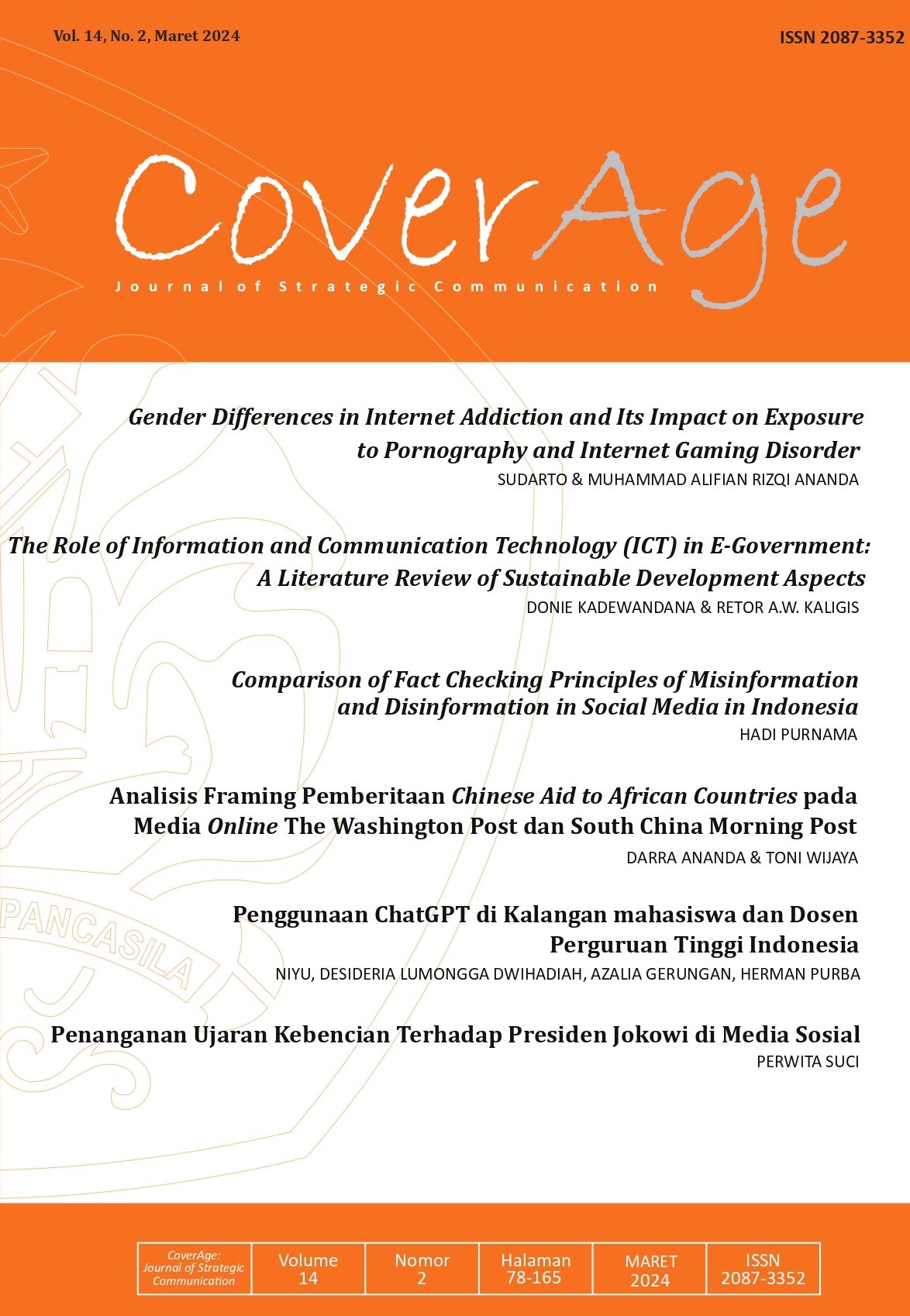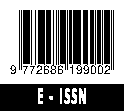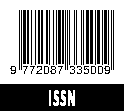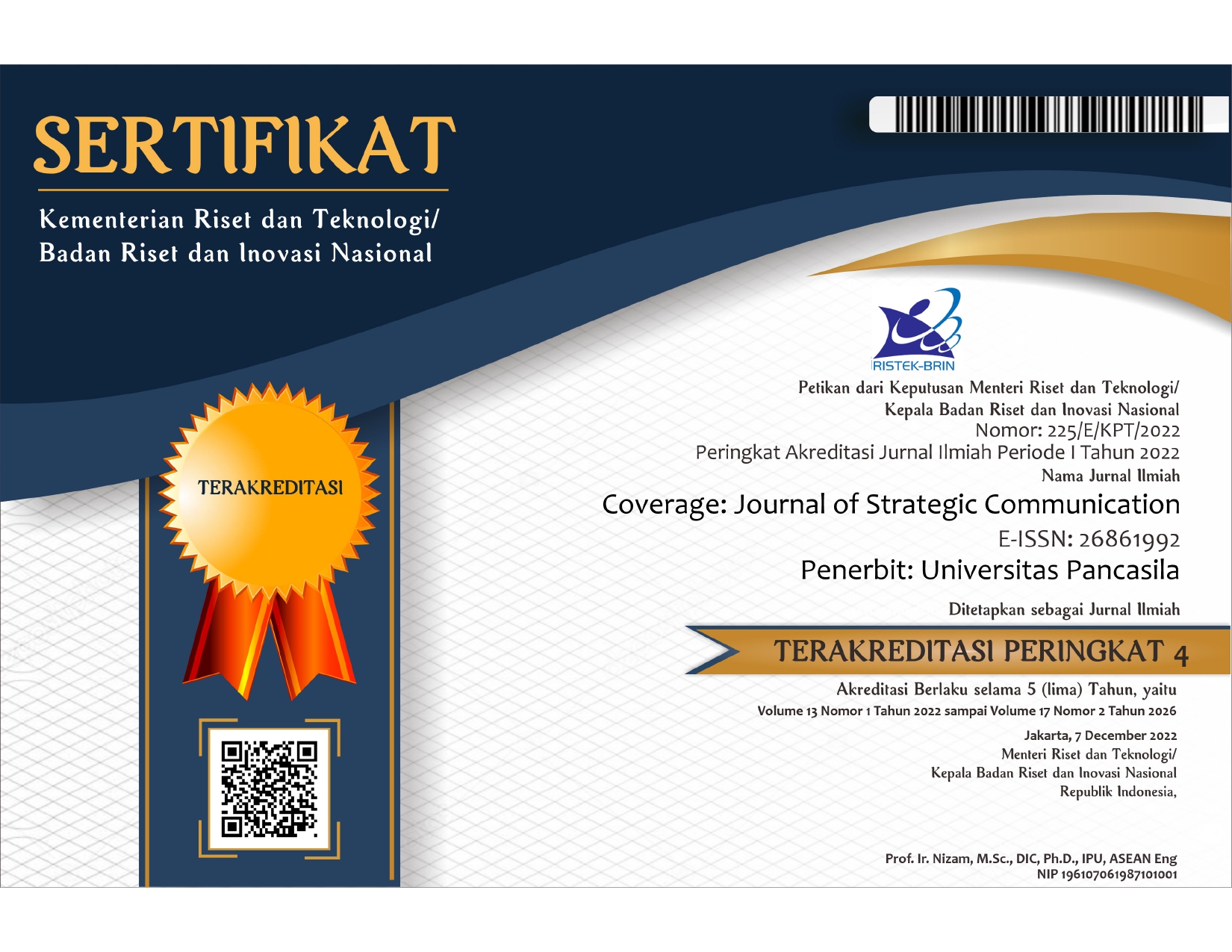The Role of Information and Communication Technology (ICT) in E-Government: A Literature Review of Sustainable Development Aspects
DOI:
https://doi.org/10.35814/coverage.v14i2.6339Keywords:
Information and Communication Technology (ICT), Electronic Government (E-Government), Sustainable Development, Communication, Environmental- Social-Economy AspectAbstract
The development of Information and Communication Technology (ICT) makes the world more borderless and communication in various sectors easier. ICT has penetrated individual, organizational, and social barriers. The impact of ICT does not only occur in private companies or organizations but also public organizations. The application of E-Government is a form of ICT application in the public sector. E-Government is a process of using ICT as a new instrument in providing public services more effectively and efficiently. This study aims to provide an overview of the role of ICT in E-Government, which supports aspects of sustainable development in the economic, social, and environmental fields. The method used to collect research data is a literature review and data analysis techniques through a qualitative approach. The results of the study show that E-Government is able to support sustainable development from both economic, social, and environmental aspects.This research recommends that government agencies must continue to innovate, especially by involving ICT and e-government in their public services. It is important because the use of this technology can support sustainability issues in various fields. Then, various studies across sectors are also needed so that comparisons can be developed regarding the challenges that need to be faced in establishing cooperation.
References
Adadi, A., Berrada, M., & El Akkad, N. (2019). Artificial Intelligence based Composition for E-Government Services. https://doi.org/10.4108/eai.24-4-2019.2284071
Al-Mushayt, O. S. (2019). Automating E-Government Services with Artificial Intelligence. IEEE Access, 7, 146821–146829. https://doi.org/10.1109/ACCESS.2019.2946204
Al-Sai, Z. A., & Abualigah, L. M. (2017). Big data and E-Government: A review. ICIT 2017 - 8th International Conference on Information Technology, Proceedings, 580–587. https://doi.org/10.1109/ ICITECH.2017.8080062
Alexopoulos, C., Diamantopoulou, V., Lachana, Z., Charalabidis, Y., Androutsopoulou, A., & Loutsaris, M. A. (2019). How machine learning is changing E-Government. ACM International Conference Proceeding Series, Part F1481, 354–363. https://doi.org/10.1145/3326365.3326412
Asato, N. (2016). Development of Japan’s E-Government: My Government as a Step Towards a Ubiquitous G2C Networked Society. Asian Conference on Society, Education & Technology. http://25qt511nswfi49iayd31ch80-wpengine.netdna-ssl.com/wp-content/uploads/papers/ acset2016/ACSET2016_33400.pdf
Backus, M. (2001).E-Governance and Developing Countries, Introduction and examples, Research Report, No. 3.
Beckline, M., Yujun, S., Eric, Z., & Kato, M. S. (2016). Paper Consumption and Environmental Impact in an Emerging Economy. Journal of Energy, Environmental & Chemical Engineering, 1(1), 13–18. https://doi. org/10.11648/j.jeece.20160101.12
Bryman, A. (2012). Social Research Methods. http://library1.nida.ac.th/termpaper6/sd/2554/19755.pdf Carter, C. R., & Rogers, D. S. (2008). A framework of sustainable supply chain management: Moving toward new theory. International Journal of Physical Distribution and Logistics Management, 38(5), 360–387.https://doi.org/10.1108/09600030810882816
Carter, C. R., & Rogers, D. S. (2008). A framework of sustainable supply chain management: Moving toward new theory. International Journal of Physical Distribution and Logistics Management, 38(5), 360–387.https://doi.org/10.1108/09600030810882816
Clift, L. (2004). E-Government and democracy: Representation and citizen engagement in the information age. UNPAN/DESA: World Public Sector Report.
Golubchikov, O., & Thornbush, M. (2020). Artificial Intelligence and Robotics in Smart City Strategies and Planned Smart Development. Smart Cities,3(4), 1133–1144. https://doi.org/10.3390/ smartcities3040056
Grigonyte, I. (2016). Bad Debt Influence on the Sustainability of the Economy of the Country. 12(16), 79–93. https://doi.org/10.19044/esj.2016.v12n16p79
Hasan, M., dan Azis, M. (2018). Pembangunan Ekonomi dan Pemberdayaan Masyarakat: Strategi Pembangunan Manusia dalam Perspektif Ekonomi Lokal (PDF) (edisi ke-2). Makassar: CV. Nur Lina. ISBN 978-602-51907-6-6.
Indrajit, R. E. (2002). Electronic Government Strategi Pembangunan dan Pengembangan Sistem Pelayanan Publik Berbasis Teknologi Digital. Yogyakarta: ANDI.
Jaya, A. (2004). Konsep Pembangunan Berkelanjutan (Sustainable Development). http://file.upi.edu/Direktori/FIP/Jur._Pend._Luar_Sekolah/195207251978031ACE_SU
RYADI/askar_ jaya.pdf
Kementerian Negara Riset dan Teknologi. (2006). Penelitian Pengembangan dan Penerapan IPTEK Bidang Teknologi dan Komunikasi Tahun 2005-2025. Jakarta: Kementerian Negara Riset dan Teknologi.
Khayyat, M., Alhemdi, F., & Alnunu, R. (2020). The Challenges and benefits of blockchain in E-government. International Journal of Computer Science and Network Security, 20(4). https://doi.org/http://dx.doi. org/10.4236/jdaip.2015.33007
Lorenzo-Romero, C., Andrés-Martínez, M. E., & Mondéjar-Jiménez, J. A. (2020). Omnichannel in the fashion industry: A qualitative analysis from a supply-side perspective. Heliyon,6(6). https://doi.org/10.1016/j. heliyon.2020.e04198
Magno, F. (2018). E-Government and Philippine development. Journal of Asia-Pacific Studies, 153–167. https://core.ac.uk/download/pdf/159504666.pdf
Miles, M. B., & A. Huberman, M. (1994). Qualitative Data Analysis: An expanded Sourcebook 2nd Edition. US: SAGE Publications Inc.
Mishaal, D. A., & Abu-shanab, E. (2015). The Effect of Using Social Media in Government: Framework of Communication Success, 357–364. https://doi.org/10.15849/icit.2015.0069
Moisescu, O. I. (2018). From perceptual corporate sustainability to customer loyalty: A multi-sectorial investigation in a developing country. Economic Research-Ekonomska Istrazivanja, 31(1), 55–72. https://doi.org/10.1080/1331677X.2017.1421998
Morelli, J., & Morelli, J. (2011). Environmental Sustainability: A Definition for Environmental Professionals. https://doi. org/10.14448/jes.01.0002
Palvia, S. C. J., & Sharma, S. S. (2007). E-Government and e-governance: definitions/domain framework and status around the world., in Agarwal, A., et al (eds.) Foundations of E-Government. 5TH International Conference On E-Governance, Hyderabad.
Papadopoulou, P., Kolomvatsos, K., & Hadjiefthymiades, S. (2019). Enhancing E-Government with internet of things. March, 110–129. https://doi.org/10.4018/978-1-5225-7955-7.ch005
Pogutz, S., Bocconi, U., & Winn, M. (2011). Corporate environmental sustainability beyond organizational boundaries : Market growth, ecosystems complexity and supply chain structure as co-determinants of environmental impact corporate environmental sustainability beyond organizational boundaries. https://doi.org/10.14448/jes.01.0004
Praditya, D. (2014). Pemanfaatan teknologi informasi dan komunikasi (TIK) di tingkat pemerintahan desa.Jurnal Penelitian Komunikasi, 17(2). Bandung: Balai Pengkajian dan Pengembangan Komunikasi dan Informatika (BPPKI).
Putri, D. P., & Kadewandana, D. (2018). Prinsip-prinsip Human Relations dalam Pelaksanaan Komunikasi Organisasi di Kementerian Komunikasi dan Informatika. CoverAge: Journal of Strategic Communication, 8(2), 24-35. https://doi.org/10.35814/coverage.v8i2.587
Rupo, D., Perano, M., Centorrino, G., & Sanchez, A. V. (2018). A framework based on sustainability, open innovation, and value cocreation paradigms-A case in an Italian maritime cluster. Sustainability(Switzerland), 10(3).
https://doi.org/10.3390/su10030729
Sartori, S., Da Silva, F. L., & De Souza Campos, L. M. (2014). Sustainability and sustainable development: A taxonomy in the field of literature. Ambiente e Sociedade, 17(1), 1–22. https://doi.org/10.1590/1809- 44220003490
Sharma. (2009). The role of PPP in value based capacity building through E-administration.Indian Journal of Public Administration, 1, 96-107.
Suhendra, A. (2017). Kesiapan Pemerintah Daerah dalam Mewujudkan Kota Cerdas di Bandung dan Surabaya. Matra Pembaruan, 1(1), 1–9. https://doi.org/10.21787/mp.1.1.2017.1-9
Taherdangkoo, M., Mona, B., & Ghasemi, K. (2018). The role of industries’ environmental reputation and competitive intensity on sustainability marketing strategy Customers’ environmental concern approach n ambiental.El papel de la reputaci o e intensidad competitiva en la estrategia de marketing sosten. 23(1), 3–24. https://doi.org/10.1108/SJME-02-2018-0005
Tascioglu, M. (2015). Sustainable supply chain management: A literature review and research agenda. 2015111519 (Brundtland 1987), 1–11. https://doi.org/10.17261/ Pressacademia.2015111519
Tõnurist, P. (2015). Technological change in the public sector: redefining control, power and authority in traditional bureaucracies. International Conference on Public Policy (ICPP), 1–22. https:// www.researchgate.net/profile/Piret-Tonurist/publication/306361340_Technological_change_ in_the_public_sector_redefining_control_power_and_authority_in_traditional_bureaucracies/ links/57bae66908ae202e6a56aee2/Technological-change-in-the-public-secto
Turnip, K., Lubis, A. H., Sutrisno, & Lubis, M. S. (2018). A review of ict in government bureaucracy: Psychological and technology skill perspectives. International Journal of Civil Engineering and Technology, 9(9), 1309–1319. https://doi.org/10.31227/osf.io/5gwxz
Utami , V. P., & Yuliana, G. D. (2017). Analisis Komunikasi Pemasaran Pada Hotel Salak The Heritage Bogor. CoverAge: Journal of Strategic Communication, 7(2), 18-28. Retrieved from https://journal.univpancasila.ac.id/index.php/coverage/article/view/572
UNESCO New Delhi &NIC India. (2005). E-Government Toolkit for Developing Countries. New Delhi: UNESCO New Delhi.
Zouridis & Thaens, Marcel. (2003). E-Government: towards a public administration approach.Asian Journal of Public Administration, 25(2), 159-183.





















